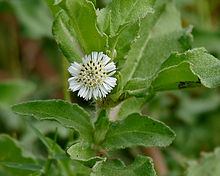Eclipta erecta
| Eclipta prostrata | |
|---|---|
 |
|
| Scientific classification | |
| Kingdom: | Plantae |
| (unranked): | Angiosperms |
| (unranked): | Eudicots |
| (unranked): | Asterids |
| Order: | Asterales |
| Family: | Asteraceae |
| Genus: | Eclipta |
| Species: | E. prostrata |
| Binomial name | |
|
Eclipta prostrata (L.) L. |
|
| Synonyms | |
|
Synonymy
|
|
Eclipta prostrata commonly known as false daisy, yerba de tago, and bhringraj, is a species of plant in the sunflower family. It is widespread across much of the world.
This plant has cylindrical, grayish roots. The solitary flower heads are 6–8 mm (0.24–0.31 in) in diameter, with white florets. The achenes are compressed and narrowly winged.
This species grows commonly in moist places as a weed in warm temperate to tropical areas worldwide. It is widely distributed throughout India, Nepal,China, Thailand, and Brazil.
The plant has traditional uses in Ayurveda. It is bitter, hot, sharp, dry in taste. In India it is known as bhangra (भांग्र), bhringaraj, bhrungraja and bhringraja. Wedelia calendulacea is known by the same names, so the white-flowered E. alba is called white bhangra and the yellow-flowered W. calendulacea is called yellow bhangra. The various Sanskrit names of Eclipta Alba, i.e. Bhringraj, Bhringraja, Bhrungraja etc., are literally translated as the 'King of Hair', clearly referring to its traditional reputation in Ayurveda as an herb supporting hair growth. Some Ayurvedic hair oils incorporate Bhringraj as an ingredient.
It is reported to improve hair growth and color. A study in rats showed that petroleum ether extracts of E. prostrata decreased the amount of time it took for hair to begin regrowing and to fully regrow in shaved albino rats. The result of treatment with E. prostrata was better than the positive control, 2% minoxidil.
In the Ayurvedic System, Eclipta Alba, as with all other herbs, is classified according to its qualities, taste, physiological effects, etc. Ayurveda states that it is: Taste – Katu (Bitter), Tikta (Pungent) Quality – Rooksha (Dry), Laghu (light to digest) Energy - Ushna (Hot) Post Digestive Effect - Pungent, i.e. undergoes a pungent taste conversion after digestion. According to Ayurveda, these qualities characterize the medicinal effects of Eclipta Alba on the body, and are expressed in Ayurvedic terms as balancing for Kapha, i.e. balancing for the moist and unctuous tissues and anabolic systems of the body such as fats and fluids, and balancing for Vata, i.e. the nervous system and catabolic functions.
...
Wikipedia

